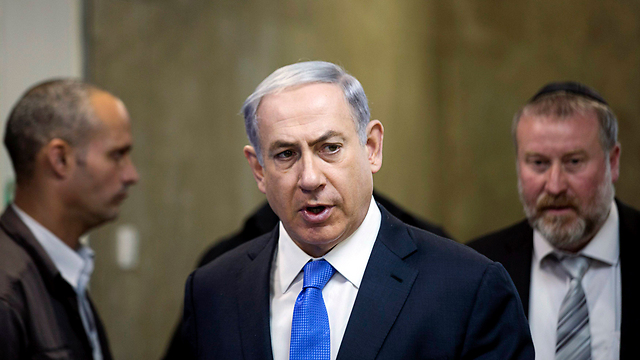
'Herzog must stop Bibi's disastrous march of folly rather than become part of it'
צילום: דוברות הכנסת
Bibi's nuclear march of folly
Op-ed: Netanyahu's policy against the Iranian nuclear program led to a strategic, military, economic, diplomatic and social disaster, and his conduct after the Vienna agreement only adds insult to injury.
In 2007, during the Olmert government's term, I participated in a ministerial committee meeting about the Iranian nuclear threat. At the end of the meeting I told a senior defense establishment official: "Look at the map of Iran. Can we guarantee that this spacious country, which is 80 times the size of Israel, won't succeed in hiding at least a significant part of its nuclear armament effort and scatter it in different places?"

I reminded him that Israel had no idea about the details of Muammar Gaddafi's nuclear program until the revelation of an agreement with the United States in which Libya gave up the program. I further reminded him that according to foreign sources, not a single Arab country knew about the establishment of the Syrian reactor, until Israel exposed its existence at around the time it became operational.
Prime Ministers Ariel Sharon and Ehud Olmert were aware of this reality and its lessons. They realized there were things which would be "too much for Israel," and that we could not act, neither alone nor openly, as they would cost us a heavy, unreasonable, bloody price and end in disappointment. Therefore, they determined that the Iranian nuclear program was a global problem, which the world powers – led by the US – should handle. Israel would contribute its share too, of course.

Even if Netanyahu 'succeeds' and the US Congress doesn’t ratify the agreement, Iran will have the best of both worlds (Photo: Reuters) (צילום: רויטרס)
And indeed, at the time, foreign sources spoke about operational and technological cooperation which had disrupted the Iranian systems and delayed the development of the nuclear ability by several years. In addition, discussions were held between Israel and the US about strategic, military and diplomatic compensation if Iran were to become a nuclear threshold state.
In 2009, Prime Minister Benjamin Netanyahu came along and changed his predecessors' smart policy. Bibi launched his nuclear march of folly, which is coming to its end these days in a colossal failure. Immediately after his election, he put himself at the lead of the global battle against Iran and announced that Israel could thwart the Iranian nuclear program on its own. That was baseless and unfounded arrogance. His intention to bomb the nuclear facilities in Iran was met with opposition from nearly all leaders of the defense establishment.
It was clear that bombing facilities in Iran would not terminate the nuclear program, just like what happened in Iraq and Syria (again, according to foreign sources). On the contrary: Even if the operation would succeed militarily, it would delay the Iranian program by a year or an year and a half, but then Iran would feel free to declare to the world that it is developing a nuclear bomb in order to defend itself against the Israeli threat.
But Bibi kept going. He invested about NIS 11 billion (roughly $2.8 billion) in the preparations for a strike in Iran, which was never executed of course, and most of this huge sum went down the drain.
Netanyahu brags to this very day that his actions led to sanctions against Iran. It's true that the sanctions hurt the Iranian economy, but not only did they fail to slow down the Iranian race – they made it even more determined. In 2009, Iran was not a clear nuclear threshold state; in 2015, it is only two or three months away from a first nuclear bomb.
Bibi's nuclear policy led to a strategic, military, economic, diplomatic and social disaster. Unfortunately, his conduct after the "Vienna agreement" adds insult to injury. The agreement is an established fact, and even if Bibi "succeeds" and the US Congress doesn’t ratify it, Iran will have the best of both worlds, as the entire world – from China and Russia to the European countries – will comply with the decisions of the Security Council and the Council of the European Union and lift the sanctions.
The restrictions on Iran, according to the Vienna agreement, will not be implemented – and Israel will not be able to enjoy a full "compensation package" from the American administration. In addition, the illusion that Bibi and his people are trying to sell, that Israel will received a significant compensation package even if the battle against US President Barack Obama fails and the agreement is approved by the Congress, will be shattered.
I would like to also dedicate a few words to Opposition Chairman Isaac Herzog, whose conduct on the Iranian issue is puzzling. First of all, he must firmly and decisively slam the foolish attempt to gain the Congress' support against the agreement and against the ongoing conflict with the American administration.
Secondly, he must try to convince Obama and his administration to give Israel a strategic and security-related compensation package, mainly concerning the war on terror, including Iranian terror. Buji must stop Bibi's disastrous march of folly rather than become part of it.
After the failure of the Yom Kippur War, then-Opposition Chairman Menachem Begin launched a focused, scathing attack on the Golda Meir government. That's the way an opposition leader should act. Herzog must wage only one campaign, consistently, seriously and clearly: Bibi, resign!
Haim Ramon served as a member of the Knesset and a minister between 1983 and 2009 on behalf of the Labor Party and Kadima.










